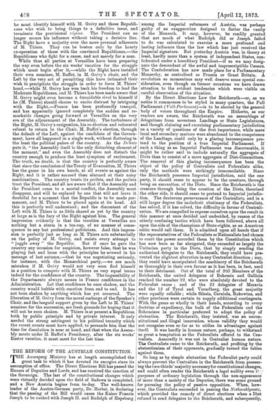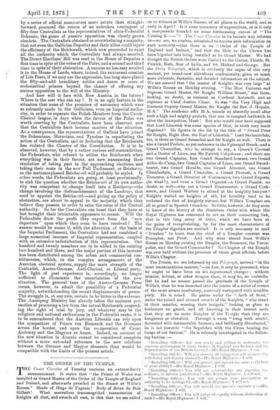THE REFORM OF THE AUSTRIAN CONSTITUTION.
THE Auersperg Ministry has at length accomplished the great task to which it has devoted its energies since its assumption of office. The Direct Elections Bill has passed the Houses of Deputies and Lords, and has received the sanction of the Sovereign. The last of the constitutional changes which were virtually decided upon the field of Sado wa is completed, and a New Austria begins from to-day. The well-known leader of the Austro-German party, Dr. Herbst, in declaring that the passing of the Bill would cause the Kaiser Francis Joseph to be ranked with Joseph II. and Rudolph of Hapsburg
among the Imperial reformers of Austria, was perhaps guilty of an exaggeration designed to flatter the vanity of the Monarch. It may, however, be readily granted that not much of what Rudolph did or Joseph failed
to do was calculated to exercise a more profound and lasting influence than the law which has just received the
Imperial signature. But yesterday Austria was, in theory at least, hardly more than a system of independent States, con- federated under a hereditary President—if so we may desig- nate the descendant of the awful and imprescriptible Caesars. The Confederation has now made place for a Parliamentary Monarchy, as centralised as Prussia or Great Britain. A revolution so momentous may well deserve some special con- sideration, even though on former occasions we have drawn attention to the evident tendencies which were visible on careful observation of the situation.
By the Direct Elections Law the Reichsrath—or, as we notice it commences to be styled in many quarters, the Full Parliament (Yell-Parlanient)—is to be elected by the general body of voters throughout the Empire. Hitherto, as our readers are aware, the Reichsrath was an assemblage of delegations from seventeen Landtags or State Legislatures, aad though claiming and exercising parliamentary jurisdiction, on a variety of questions of the first importance, while mere local and secondary matters were abandoned to the competence of the Landtags, could only by a glaring inconsequence pre- tend to the position of a true Imperial Parliament. If such a thing as an Imperial Parliament was discoverable, it might be rather said to include naturally the aggregate of Diets than to consist of 'a mere aggregate of Diet-Committees. The removal of this glaring inconsequence has been the object of the policy of Centralists and Federalists alike,
only the methods were strikingly irreconcilable. Since the Reichsrath possesses Imperial jurisdiction, said the one party, it should cease to appear to be the creature, through being an emanation, of the Diets. Since the Reichsrath is the creature through being the creation of the Diets, theorised the other side, it should cease to pretend to Imperial jurisdic- tion. The dexterous perseverance of the Centralists, and in a still larger degree the maladroit obstinacy of the Federalists, has solved, if it has solved, the difficulty in favour of Centrali- sation. We are compelled to express ourselves upon the result in this manner at once decided and undecided, by reason of the utterly confusing tactics which have been followed, above all upon the side of the champions of State-rights, as an American critic would call them. It is admitted upon all hands that if the representatives of the Federalists or Nationalists had chosen to exert the power accorded them by the Constitution which has now been so far abrogated, they exceeded so largely the Unitarian party in the Diets, that by simply sending the authorised delegates to the Reichsrath, they could have pre- vented the slightest alteration in any Centralist direction ; nay, they could have manipulated the machinery of the Reiehsrath as thoroughly in their own favour as it has been, in fact, used to their detriment. Out of the total of 203 Members of the Reichsrath, the united delegates of Bohemia and Gallicia reached the number 92, who were absolutely devoted to the Federalist cause ; and of the 22 delegates of Moravia and the 12 of Tyrol and Vorarlberg, the great majority were equally reliable ; while Silesia, Carniola, Bukowina, and other provinces were certain to supply additional contingents. With the game so wholly in their hands, according to every doctrine of expediency, the bulk of the Federalists and the Bohemians in particular preferred to adopt the policy of abstention. The Reichsrath, they insisted, was an uncon- stitutional and illegal innovation, whose validity they would not recognise even so far as to utilise its advantages against itself. It was hardly in human nature, perhaps, to withstand so great a temptation as the Federalists offered to the Cen- tralists. Assuredly it was not in Centralist human nature. The Centralists came to the Reichsrath, and profiting by the abstentionism of their opponents, gradually turned the tables against them.
So long as by simple abstention the Federalist party could always prevent the Centralists in the Reicherath from possess- ing the two-thirds' majority necessary for constitutional changes,, and could often render the Reichsrath a legal nullity even purposes of ordinary legislation through the non-appearance of more than a moiety of the Deputies, there was some ground
for pursuing the policy of passive opposition. When, how- ever, the Centralists succeeded in passing the Nothwahlgesetz, which provided the remedy of direct elections when a Diet refused to send delegates to the Reichsrath, and subsequently, by a series of official manoeuvres more astute than straight- forward, procured the return of an unbroken contingent of fifty-four Centralists as the representatives of ultra-Federalist Bohemia, the game of passive opposition was clearly grown obsolete. The Centralists obtained so overwhelming a majority, that not even the Gallician Deputies and their allies could injure the efficiency of the Reichsrath, which now proceeded to exert all the authority which the Centralists had always asserted. The Direct Elections' Bill was read in the House of Deputies a first time in spite of the votes of the Poles, and a second and third time in spite of their abstention. A success no less easy awaited it in the House of Lords, where, indeed, the exuberant creation of Life Peers, if we may use the expression, has long since placed the fifty-and-odd hereditary nobles and dozen or score of ecclesiastical princes beyond the chance of offering any serious opposition to the will of the Ministry.
And how will it fare with New Austria in the future ? Where is the seer who can say ? It is an ugly feature in the situation that none of the promises of autonomy which were so solemnly made to the Gallicians, even on Imperial autho- rity, in order to separate the Polish Members from the Czech- Clerical league, in days when the favour of the Poles was worth courting by the Centralists, have been observed, now that the Centralists have become masters of the situation. As a consequence, the representatives of Gallicia have joined the Bohemians, Moravians, and Tyrolese in repudiating the action of the Centralists, and in declaring that the Reichsrath has violated the Charter of the Constitution. It is to be observed, however, that by a rather curious self-contradiction, the Federalists, who refused to utilise the Reichsrath when everything was in their favour, are now announcing their resolution of taking part in the approaching elections, and taking their seats in the new Full Parliament, or Reichstag, as the metamorphosed Reichsrath will probably be styled. In other words, the Federalists are going, at least provisionally, to sink the question whether the Reichsrath of its own autho- rity was competent to change itself into a Reichstag—the change involving the disfranchisement of the Landtags, that used to appoint the Reichsrath—and giving up the policy of abstention, are about to appeal to the majority, which they believe they possess, in order to seize the reins of the Central authority. So far the Centralists can boast that they have at last brought their intractable opponents to reason. Will the , Federalists draw the profit they expect from the "new' departure " upon which they seem to have resolved ? The answer would be easier if, with the alteration of the basis of the Imperial Parliament, the Centralists had not combined a large numerical increase of Imperial representation, coupled with an extensive redistribution of this representation. One hundred and twenty members are to be added to the existing two hundred and three, and the major portion of this increase has been distributed among the urban and commercial con- stituencies, which, in the complex arrangements of the Austrian electoral system, supply the main strength of the Centralist, Austro-German, Anti-Clerical, or Liberal party. The light of past experience is, accordingly, no longer sufficient to illuminate the uncertainties of the new I situation. The general tone of the Austro-German Press seems, however, to admit the possibility of a Federalist majority, notwithstanding the recent displacements of power. The struggle is, at any rate, certain to be bitter in the extreme. The Auersperg Ministry has already taken the ominous pre- caution of procuring a law from the actual Reichsrath suspend-
ing the right of trial by jury, and whatever may be the religious and national enthusiasm in the Federalist ranks, it is
to be remembered that the Austrian Liberals can rely upon
the sympathies of Prince von Bismarck and the Germans across the border, and upon the co-operation of Count Andrassy and the Magyars at home. Indeed, an account of the new situation in Austria cannot be considered complete without a more extended reference to the new relations between the German and Magyar elements than would be compatible with the limits of the present article.



































 Previous page
Previous page